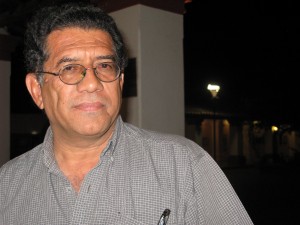
 Five poems by Carlos Pintado translated and introduced by Hilary Vaughn Dobel.
Five poems by Carlos Pintado translated and introduced by Hilary Vaughn Dobel.
Reading Carlos Pintado’s Nine Coins (winner of the Paz Prize for Poetry from the National Poetry Series; available from Akashic Books) in its original Spanish is an almost otherworldly experience. The poems have a timeless quality, mixing formal sonnets with free verse and prose, addressing universal themes: love and wanting, light and dark, dreams and sleepless nights. They are beautiful machines that make you feel things.
And so I fell in love with the poems, with their meaning and their music. The meaning, I think I was mostly able to bring across into English. The music, though, was difficult. Because English is so rhyme-poor and because many of Carlos’ poems are rhymed sonnets, I worked instead with meter and settled for occasional slant rhymes and sight-rhymes. Even if you’re not a Spanish speaker, I urge you to read through the originals just to get a sense of their sound.
There were other times during the translation process when, despite the deeply emotive quality of the poems, I almost felt that voice of the poet had become depersonalized, like an oracle channeling something larger than the self. I hope I was able to bring this oracular nature across, as well—to capture that same feeling of a prophetic “I” speaking somewhere out of time.
—Hilary Vaughn Dobel
Postal para Elizabeth Bishop
by Carlos Pintadowhere the shadows are really the body
—E.B.
He tenido en un sueño las horas de la noche:
sus altas horas siempre, sus ruinosos silencios,
sus ecos, sus penumbras, sus fatales contornos
he tenido. La noche ha hecho en mí su casa.
He soñado mi cuerpo como una sombra entrando
en otra sombra, cuerpo de mí o de la noche,
como un fuego en tinieblas despacio devorándome.
He soñado mi muerte como un país lejano,
como un anillo de oro hundiéndose en el agua.
Acaso el sueño acerca inevitablemente
al muerto con su muerte, al vivo con su espejo.
Yo he sentido ese horror que ciega y me confunde
con la imagen del otro: una sombra que en mí persiste,
animal de la noche rompiéndose en la noche.
Postcard to Elizabeth Bishop
by Carlos Pintadowhere the shadows are really the body
—E.B.
I’ve been dreaming of the night and all its hours:
its small, late hours, of course, its crumbling silences,
its echoes, and its half-light; its deadly contours,
I’ve dreamed as well. The night has made its home in me.
I’ve dreamed my body like a shadow entering
another shadow, my body or else the night’s,
devouring me slowly like a fire in the dark.
I’ve dreamed my death like some far-off land, like
a golden ring as it sinks into water.
Perhaps the dream will come inexorably close
to dying with its death; to life with its mirror.
And I have known the horror that blinds and bewilders
with the image of the other: a shadow that persists in me,
a creature of the night gone to pieces in the night.
translated from Spanish by Hilary Vaughn DobelOther World, M.C. Escher
by Carlos PintadoOtro mundo me espera: soy la forma
que, en el cuadro sin centro, busca un ciego
orden de cosas que es también trasiego,
donde no hay ley, ni causa, ni hay la norma.
Otro mundo me espera: los flotantes
cuernos perduran, giran, se deshacen.
¿Sabré yo acaso con qué metal se hacen,
si mientras más cercanos, más distantes?
Otro mundo me espera: la ventana
en su mitad se alza, y mi prodigio
será quedar del lado de las cosas.
Otro mundo me espera: la mañana,
como un umbral de luz, hará el litigio
de la noche que muere con las rosas.
Other World, M.C. Escher
by Carlos PintadoAnother world awaits me: I’m the form
that, in the picture with no center, seeks
an order, blind but also bustling,
where there is no law or cause, no norm.
Another world awaits me: the buoyant
horns persist and linger, turn and shatter.
Can I learn what metal makes them,
whether they draw closer or more distant?
Another world awaits me: the window
lies half-open, and my miracle will be
to stay here in the realm of the material.
Another world awaits me: the morning,
with the dawning of the light, will stand
against the night that dies with all the roses.
translated from Spanish by Hilary Vaughn DobelPaisaje con sombra y casa
que da a la noche
by Carlos PintadoHuid, niños, de la muerte.
Jueguen. Apártense de mí.
No quisiera yo compartir la infinitud de una plaza,
ni la risa que abre en el aire su más deseable rosa.
Enfermo de enfermas cosas estoy.
Soy una casa oscura
que da a la noche, una casa
habitada tan sólo por los muertos.
Huid de mí, niños de la muerte.
Soy yo quien cierra una ventana a ustedes.
Soy yo quien pasa como un cadáver
ante el asombro de todos.
Yo esperaba al ángel de ojos afilados.
Yo esperaba al ángel.
Y las ventanas se abrieron a la noche,
y yo no fui más.
Yo no fui
yo.
Landscape with Shadow and House
Overlooking the Night
by Carlos PintadoFly, children, from death.
Play. Keep back from me.
I would not want to share the infinity of a plaza,
nor the laughter that unfurls its most coveted rose
into the air.
I am sick with sick things.
I am a darkened house
that overlooks the night, a house
where none dwell but the dead.
Fly from me, children of death.
It is I who bar a window against you.
It is I who walk about like a corpse
to the astonishment of all.
I was waiting for an angel with keen eyes.
I was waiting for an angel.
And the windows opened to the night,
and I was no more,
I was not
Me.
translated from Spanish by Hilary Vaughn DobelRegresos
by Carlos PintadoDeambulo por tu sueño y soy
tu propio sueño, dormido.
Bestias de la noche, venid a mí.
Ángeles hermosos, bebed mi sangre.
Yo he sido breve
al cruzar por los espejos,
breve como un golpe de sol
sobre las aguas muertas.
Yo he sido breve.
Largo es el camino
y mis pasos breves.
¿Qué amor me habrá salvado?
¿Qué labio injurió al viento
como si fuera mi nombre
el susurro levísimo de la mies en los campos?
¿Soy yo el que regresa?
Soy yo?
Returning
by Carlos PintadoI wander through your dream and I
am your own dream, asleep.
Creatures of the night, come to me.
Gorgeous angels, drink my blood.
I have been brief
on crossing through the mirrors,
brief as sun striking
on dead waters.
I have been brief.
Long is the road
and my steps are brief.
What love can save me?
What lip tarnished the wind
as if my name
were the softest whisper of grain in the fields.
Is it I who returns?
Is it I?
translated from Spanish by Hilary Vaughn DobelBESbswyBESbswyBESbswyBESbswyBESbswyBESbswyBESbswyBESbswyBESbswyBESbswyBESbswyBESbswyBESbswyBESbswyBESbswyBESbswy
El desierto
by Carlos PintadoDoradas circunstancias de la sed
figuran los baldíos espejismos
donde todo perece; en ese abismo
un hombre muere solo con su sed.
Los sucesivos rostros de la luna
han de otorgarle un único consuelo:
soñarse devorado en aquel suelo
y en aquel suelo despertar. Ninguna
salida habrá: el mar de las arenas
repetirá incesante la figura
de un muerto que recorre la llanura
que los dioses negaron terminar.
Porque también eterno es aquel mar
de polvo, sueños, soledades, penas.
The Desert
by Carlos PintadoThirst, its golden circumstances,
renders vain mirages where all
must perish; a man in that hell
may die alone with just his thirst.
The moon’s successive faces have
bestowed this single solace: to dream
oneself devoured by the ground
and on that ground awaken. Nothing
will have gone: the endless sea of sand
will still repeat a dead man’s shape
as it travels through the plains—plains
the gods refused to end. For it, too,
goes on forever, that sea of dreams
and dust, of solitudes and shame.
translated from Spanish by Hilary Vaughn Dobel
 mail. Three years after that, we met in person for the first time, in his hometown of Espinal. Before that meeting, José Alfredo sent me a new cycle of poems, called Ripapa. Escobar Martínez writes in Spanish, including Zapotec words in his work. He explains the Zapotec title, Ripapa, as “que vuela, se agita, late.” In Mexican Spanish, as spoken on the Isthmus of Tehuantepec, latir does not just mean “to beat” – as a heart or a pair of wings does, but also to have a hunch or a feeling about something. A sort of truth pulsing through one’s veins.
mail. Three years after that, we met in person for the first time, in his hometown of Espinal. Before that meeting, José Alfredo sent me a new cycle of poems, called Ripapa. Escobar Martínez writes in Spanish, including Zapotec words in his work. He explains the Zapotec title, Ripapa, as “que vuela, se agita, late.” In Mexican Spanish, as spoken on the Isthmus of Tehuantepec, latir does not just mean “to beat” – as a heart or a pair of wings does, but also to have a hunch or a feeling about something. A sort of truth pulsing through one’s veins.